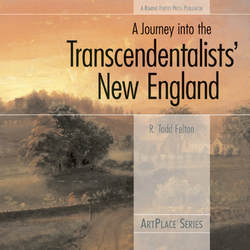Читать книгу A Journey Into the Transcendentalists' New England - R. Todd Felton - Страница 14
На сайте Литреса книга снята с продажи.
Inspiration from the Land: Transcendentalist Geography
ОглавлениеTranscendentalism so fitted New England that it could be said to have sprung from the rocky soil itself. The region’s heritage of religious orthodoxy, its belief in education, and the ruggedness of its landscapes make the New Englander a breed apart. Raised on lengthy orations from the pulpit and indoctrinated with the ideals of independence, the men and women of nineteenth-century New England were practical, well educated, and imbued with a belief in individual conscience. They wanted to know how to improve their lives but were leery of overbearing authority. They listened to their local ministers, joined social movements, and attended lyceums.
Boston’s centrality to both the commerce and the culture of early-nineteenth-century America made it the crossroads of Transcendentalism. The Transcendental Club met here, as did the founders of the Brook Farm utopian community. The publishers responsible for introducing the world outside of Boston to the ideas of the Transcendentalists were here. Innumerable lectures, “conversations” (discussion groups led by a paid moderator), and educational ventures allowed Bostonians to witness firsthand the quest of the Transcendentalist seekers and to draw inspiration from their journeys.
Just across the river from Boston, Cambridge provided a training ground and launching pad for Transcendentalism. Home to Harvard College, this city and the college helped develop the young minds of the seekers before sending them out, frequently to the Unitarian pulpits of Boston and beyond. The college also hosted two Emersonian orations that set the direction for the Transcendentalist movement, “The American Scholar” in 1837 and the “Divinity School Address” in 1838.
Once the movement started, the small village west of Boston called Concord became its heart and soul. Although only Henry David Thoreau among the Transcendentalists was born in Concord, Emerson’s return in 1834 to the town of his ancestors created a center of gravity there that drew in almost all of the Transcendentalists at one point or another. In addition to Emerson and Thoreau, the mystic and educational reformer Bronson Alcott, the reclusive novelist Nathaniel Hawthorne, the social reformer Franklin Sanborn, and the poet Ellery Channing (nephew of the minister) all made their homes in Concord. The list of frequent Transcendentalist visitors is equally as impressive: the feminist and Transcendental critic Margaret Fuller; Salem’s mystic poet Jones Very; Brook Farm founder George Ripley; the impassioned Boston preacher Theodore Parker; Transcendental publisher and educator Elizabeth Palmer Peabody; and even Walt Whitman ventured out to Concord.
The environs of Concord also provided an ideal location for the best-known example of Transcendentalist living, Walden Pond. This popular swimming and fishing hole hosted Thoreau’s two-year experiment in living “deliberately,” and has since become a shrine that is both secular and sacred. While it was his day-to-day living at the pond from 1845 to 1847 that brought Thoreau closer to an “original relation to the universe” than any of his fellow seekers, that experience cannot be separated from the account he chose to give the world in 1854: Walden; or, Life in the Woods.
While most of the Transcendentalists were turning their backs on the rigid orthodoxy of their Calvinist past, one writer chose to pick through the ruins of his Puritan ancestry in order to develop his own relation to the universe. Salem, a seafaring port just north of Boston, provided Nathaniel Hawthorne with ample sins of the past to grapple with in his fiction. The city of the famous witch trials, fallen on hard times in the nineteenth century, was a perfect place for the writer of The Scarlet Letter to develop his mind and ideas. The town’s proximity to Boston also allowed two other natives—Elizabeth Palmer Peabody and Jones Very—to embark on their own Transcendentalist quests.
It was precisely the flawed societal structures of their predecessors that many of the Transcendentalists felt held them and others back from their quest. Two of the largest and best-known attempts at forming transcendent communities were George Ripley’s Brook Farm Institute of Agriculture and Education, in the Boston suburb of West Roxbury, and Bronson Alcott and Charles Lane’s Fruitlands, just west of Concord. Although neither of these communities lasted long enough to be deemed truly successful, their attempts to bring society into better alignment with Transcendentalist philosophies were admirable for their optimism, if not for their practicality.
